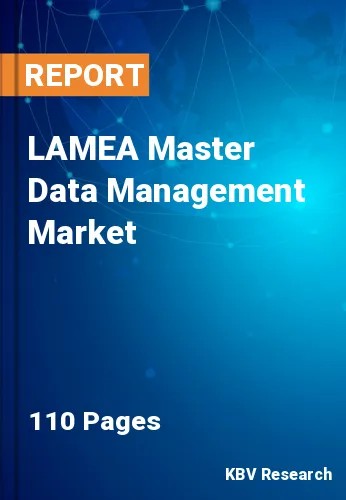The Latin America, Middle East and Africa Master Data Management Market would witness market growth of 18.5% CAGR during the forecast period (2022-2028).
Large enterprises, firms with extensively scattered data across numerous systems, and businesses that engage in frequent or large-scale acquisitions and mergers are all engaged in MDM. In addition, MDM is meant to address the wide-ranging data integration difficulties that come with acquiring another company. As a result, MDM can shorten the time it takes for an acquisition to pay off. MDM also helps firms with divided product lines, different interaction points, platforms, and distant geographies avoid fragmented customer experiences. MDM gives businesses the assurance that the data they work on is reliable and trustworthy.
MDM also reduces costly redundancies that emerge when organizations rely on various, conflicting information sources by providing a single point of reference for essential business information. When client contact information changes, for example, MDM can ensure that the company does not conduct sales or marketing outreach utilizing both the new and old information. Customer experience, mergers, and acquisitions, analytics, operational efficiency, governance and compliance, supplier optimization, as well as product experience are all common corporate efforts handled by MDM.
Because it facilitates savings and investment, financial sector expansion is one of the cornerstones of economic progress. According to the United States Department of Treasury, Sub-Saharan Africa's economy is anticipated to develop at least 4-5% each year in order to supply enough productive jobs, food, and rising salaries to its growing population. To achieve this goal, the region is focusing on boosting its productivity, investments, and domestic savings. Domestic savings in Sub-Saharan Africa are gradually rising, accounting for approximately 12% of total GDP.
The Brazil market dominated the LAMEA Master Data Management Market by Country in 2021, and would continue to be a dominant market till 2028; thereby, achieving a market value of $779.8 million by 2028. The Argentina market would witness a CAGR of 19.2% during (2022 - 2028). Additionally, The UAE market is anticipated to grow at a CAGR of 18.2% during (2022 - 2028).
Based on Component, the market is segmented into Solution and Services. Based on Vertical, the market is segmented into BFSI, Telecom & IT, Manufacturing, Retail, Government & Public Sector, Healthcare & Life Sciences, Energy & Utilities and Others. Based on Organization size, the market is segmented into Large On-premise and SMEs. Based on Deployment Mode, the market is segmented into On-premise and Cloud.
Free Valuable Insights: The Global Master Data Management Market is Predict to reach $39.4 Billion by 2028, at a CAGR of 15.6%
The market research report covers the analysis of key stake holders of the market. Key companies profiled in the report include IBM Corporation, Oracle Corporation, SAP SE, Teradata Corporation, Cloudera, Inc., Tibco Software, Inc. (Vista Equity Partners), SAS Institute, Inc., Stibo Systems, Inc. (The Stibo Group), Informatica, LLC, Syndigo, LLC (Riversand)
By Component
By Vertical
By Organization size
By Deployment Mode
By Country
Our team of dedicated experts can provide you with attractive expansion opportunities for your business.

